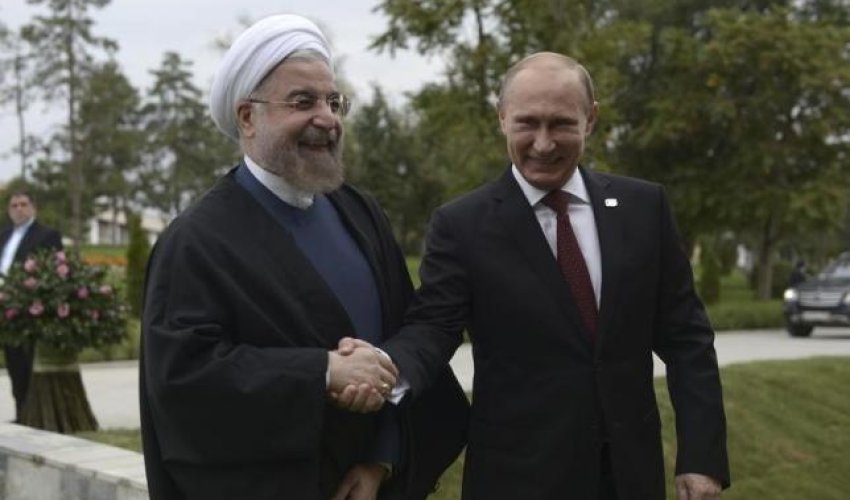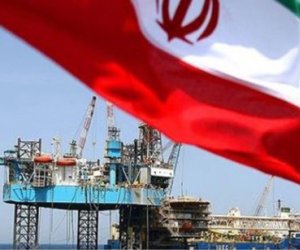Russia confirms Iran oil-for-goods swap, no signs seen

Russian traders, analysts and industry players on Tuesday questioned Moscow's announcement that a long-heralded oil-for-assets barter deal with Iran was already being implemented, saying they saw no signs of extra trade.
Russian officials said on Monday Russia was sending grain, equipment and construction materials to Iran in the barter deal, the first step in securing a foothold in a new market since the West imposed sanctions on Russia over Ukraine.
On Tuesday, the Kremlin confirmed the deal was being implemented.
The announcement and an accompanying one that Russia was ready to supply an advanced S-300 anti-missile system to Tehran, prompted alarm in Washington, which, along with other Western countries and the United Nations, has imposed sanctions on Iran over its disputed nuclear program.
Politically sensitive negotiations are now in their final stages on a deal to end a decades-old dispute between Iran and the United States, Britain, France, Russia, China and Germany on the nuclear program, which the West suspects has military aims and Tehran says is peaceful.
Russia has acted quickly to cement ties with Iran after an interim deal was reached this month on curbing the Islamic republic's nuclear program in exchange for removing economic sanctions. Talks will resume on April 21 with the aim of reaching a final accord by the end of June.
A precise mechanism and timetable for lifting sanctions against Iran is still to be worked out. Russia says an arms embargo on Tehran should also be lifted once the final nuclear deal is in place.
On Tuesday, German Foreign Minister Frank-Walter Steinmeier said of the missile plan that it was too early to be giving out rewards.
Sources told Reuters more than a year ago a barter deal could be worth up to $20 billion and involve Russia buying up to 500,000 barrels of Iranian oil a day. Officials have since issued contradictory statements on whether one had been signed.
Deputy Foreign Minister Sergei Ryabkov said on Monday Russia had started supplying grain, equipment and construction materials to Iran in exchange for crude oil, but Energy Minister Alexander Novak said Iran had not supplied oil.
"We are supplying our equipment, our works, we will complete work on power plant construction, a part of a railroad, and so on," he was quoted as saying by RIA news agency.
On Tuesday, the Kremlin spokesman declined to give any details of the deal. But asked whether Ryabkov was correct, he told reporters: "Absolutely. Of course."
NO SIGN
Russia's state grain trader United Grain Company has not supplied grain to Iran, a source at the company said about the barter deal. Oil traders said they had seen no sign of it.
"I think it's just a political statement, I haven't heard of any volumes to be shipped yet," one trader said on condition of anonymity.
Another trader also called it a "political trick". "People would have known about it ... One can't conceal the fact of the supplies," he said.
Traders said the oil taken from Iran could be sent on to other markets, such as India, shipped by Russian companies such as state-controlled energy firm Rosneft and therefore never have to be registered in Russia.
But they said such trade would also be visible and also questioned why the Kremlin would want more oil in a market which is already oversupplied.
Russian oil majors, including Rosneft, Lukoil and Gazprom Neft declined immediate comment.
With the government's budget dependent on revenues from oil exports, Russia needs higher prices to be able to afford Putin's generous social policies and increased spending on defense, part of the president's wish to see Russia as a global power again.
Some traders and analysts said it was more in Russia's interest for the international trading sanctions on Iran to stay in place. "Of course, Russia wants the sanctions to be extended. More oil on the market does not benefit it," said Mikhail Krutikhin, a partner at Moscow-based RusEnergy consultancy.
Konstantin Remchukov, the chief editor of Russian Nezavisimaya Gazeta, told Ekho Moskvy radio station: "It's quite possible that the (missile) complex supplies could lead to further escalation and wreak the final agreement signing scheduled for June."
President Vladimir Putin lifted a self-imposed ban on delivering the air defense system to Iran on Monday, apparently to secure a foothold for Russian companies in a much-needed new market after the West imposed sanctions on Russia over Ukraine.
"On the whole you can say one thing - from the legal point of view there are no longer any constraints now that the decree has been signed," Kremlin spokesman Dmitry Peskov said in a conference call with reporters.
In 2010, under Western pressure, Russia suspended a 2007 agreement to sell five S-300 batteries to Iran under a contract then reported to be worth some $800 million.
On Tuesday Israeli Prime Minister Benjamin Netanyahu said selling missiles to Iran would destabilize the Middle East, while Putin told him they had only defensive capabilities and did not post a threat to Israel.
Nikolai Patrushev, head of the Kremlin's Security Council, said in comments broadcast by the Rossiya 24 television: "The international situation has changed and this is why the Russian president decided to carry out the (missiles) contract."
Russian TASS news agency quoted Ali Shamkhani, Secretary of Iran's Supreme National Security Council, as saying in Moscow he expected deliveries before the end of the year and that Tehran would drop a legal suit against Russia once they were completed.
Iran has taken Russia to arbitration over the blocked sale of the S-300 and filed a $4 billion lawsuit against its state arms exporter Rosoboronexport.
"Removing this snag would further help development of our bilateral ties," Shamkhani said.
The deal will be discussed further when Iran's defense minister, Hossein Dehghan, visits Moscow in the coming days, said Iran expert at the Russian Academy of Sciences, Vladimir Sazhin, adding that Tehran used to be Moscow's third-largest defense and military trade partner.
"Russia is keen to rebuild those ties," Sazhin said.
(reuters.com)
ANN.Az
www.ann.az
Similar news
Similar news
Latest news 
More news 



































 Photo
Photo 



 Video
Video 
